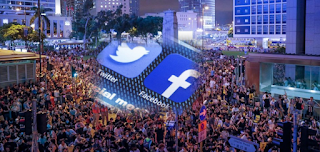Twitter and Facebook may be blocked by the Chinese government, but it obviously does not prevent Beijing to use these networks for propaganda purposes. Chinese authorities have used nearly a thousand Twitter accounts, and to a lesser extent Facebook pages, to discredit and divide pro-democracy protesters in Hong Kong, the two social networks said on Monday.
Twitter suspended 986 accounts, "coordinated as part of a Chinese state-backed operation" to "undermine the legitimacy and political positions" of protesters, says Twitter in a blog post. "We have identified large sets of accounts that behave in a coordinated way to amplify the messages about the Hong Kong protests," said the California group.
VPN and unlocked IP addresses
Facebook, informed by Twitter, said for its part have deleted, for the same reasons, seven pages, five accounts and three groups of the social network, also "related to individuals associated with the government of Beijing." Not without irony, Twitter recalls that it is banned from mainland China by the Beijing regime, whose agents had to largely use a VPN (a virtual network to bypass geographical restrictions for example). Others have advanced less masked by using unlocked IP addresses for the occasion.
In total, Twitter says it has suspended 200,000 accounts before they are actually active on the network. Facebook - also banned in Mainland China - said that about 15,500 accounts followed one or more of the pages now removed from its platform.
Under surveillance, protesters counterattack
More broadly, the Chinese authorities are massively using digital surveillance to identify protesters. Which counterattack then trying to cover their tracks. Geolocation of the cut phone, metro tickets paid in cash, silence on social networks, use of encrypted Telegram messaging ... Many demonstrators in Hong Kong are trying to remain invisible on the Internet to avoid possible legal proceedings. Many also wear masks, goggles, helmets or caps to protect themselves from gas and bullets, but also to be more difficult to identify.
